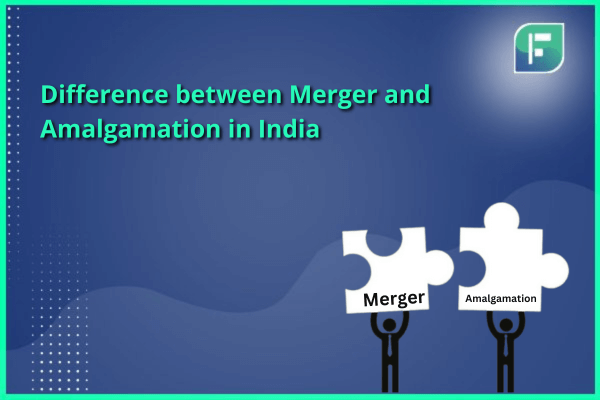Merger and amalgamation are commonly used strategies in business takeovers aimed at growth and improving market returns. These deals are on the rise, with amalgamation involving one business entity acquiring one or more entities to create a new one. A merger involves the consolidation of two or more companies to form a single entity. This newly created entity possesses a fresh management structure, often a blend of the merging companies’ management. In this blog, we shall see the difference between merger and amalgamation in India.
Meaning of Amalgamation of Companies in India
Before jumping into the difference between merger and amalgamation in India, let us understand the basic concepts first. An amalgamation of companies represents a strategic business move where two or more entities converge to establish a novel corporate entity. This process typically entails a larger, financially robust company merging with one or several smaller, financially less stable companies.
Meaning of Merger of Companies in India
To understand the difference between merger and amalgamation in India, first consider the notion of merger. A company merger in India occurs when one company absorbs another, with the merging organizations often functioning in the same area of business. A merger’s goal is to allow growth and diversity of its offerings.
Objectives for Mergers
Reasons for mergers include:
1. Removing Trade Barriers: Mergers can help in eliminating trade barriers that may exist between companies, enhancing their market reach and penetration.
2. Creating a Stronger Entity: Merging companies can join forces to create a stronger, more competitive entity in the market, consolidating their position and influence.
3. Resource Pooling: By combining their resources, companies can achieve economies of scale, reduce operational costs, and improve overall efficiency.
Benefits of Merger and Amalgamation in India for Companies
The benefits of the process of merger and amalgamation are:
1. Diversification Across Industries
Amalgamation and mergers enable companies to diversify into multiple industries seamlessly, eliminating the need to start from scratch.
2. Economies of Scale
Fostering economies of scale is a primary driver. This includes cost optimisation, efficient resource utilisation, access to larger markets, and more.
3. Synergy in Operations
Companies seek to achieve synergy in operations by targeting businesses in the same product line or industry, amplifying their combined effectiveness.
4. Rapid Growth
Mergers provide a means for companies to achieve growth swiftly, without the lengthy process of organic expansion.
5. Tax Advantages
Combining a profitable company with a loss-making one can result in reduced tax liabilities, offering strategic tax advantages.
6. Competition Reduction
Mergers serve to diminish competition within a specific industry by consolidating two entities.
7. Effective Financial Resource Utilisation
By merging with an entity boasting a larger balance sheet, companies can utilise financial resources more effectively and enhance financial planning.
8. Control Over the Value Chain
Amalgamation and mergers empower companies to bolster their control over the value chain through backward and forward integration strategies.
Major Difference between Merger and Amalgamation in India
The major points of difference between merger and amalgamation in India are as follows:
| Difference between Merger and Amalgamation in India | Merger | Amalgamation |
| Meaning | A merger involves similar businesses coming together to gain advantages. | Amalgamation typically occurs when a larger company acquires smaller ones. |
| Type | Merger types include Horizontal, Vertical, Reverse, and Co-generic mergers. | Amalgamation is the nature of purchase rather than the type of merger. |
| Retaining Identity | In a merger, the acquiring company may or may not retain its identity. | In amalgamation, the acquiring company retains its identity, while the smaller company loses its identity. |
| Initiative | The initiative to merge is generally taken by the acquiring company. | Both the companies involved take the initiative to amalgamate in amalgamation. |
| Controlling Stake | The controlling stake can be mutually agreed upon and discussed between the two parties during a merger. | In amalgamation, the controlling stake belongs to the acquirer, and the target company becomes a minority shareholder. |
| Legal Formalities | Mergers typically involve more complex legal formalities. | Amalgamations usually have fewer legal formalities compared to mergers. |
| Assets and Liabilities | In a merger, the existing company keeps its assets and liabilities while also assuming those of the other company. | In amalgamation, the assets and liabilities of the amalgamating companies are transferred to a new entity. |
| Transfer of Assets and Liabilities | In mergers, assets and liabilities are consolidated in the merged company. | In amalgamations, assets and liabilities are transferred to the balance sheet of the new company. |
| Size of the Company | Companies involved in mergers are typically larger in size and operations. | Target companies in amalgamations are usually smaller in size. |
Final Thoughts
The difference between merger and amalgamation in India is important for businesses considering strategic growth initiatives. Mergers involve the consolidation of similar businesses, fostering competitiveness and operational synergy, while amalgamations often encompass a larger company absorbing smaller entities to achieve expansion and diversification. In learning the difference between merger and amalgamation in India, each approach comes with its unique benefits, from gaining a competitive edge and diversifying across industries to achieving economies of scale and tax advantages. Furthermore, the various types of mergers and amalgamations provide companies with a spectrum of strategic options tailored to their specific objectives. Understanding these nuances is essential for businesses seeking to navigate the complex system of corporate restructuring and consolidation in India’s dynamic market.





